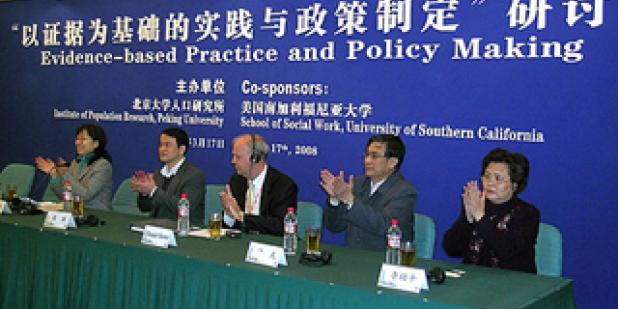Join us for a free one-day workshop for educators at the Japanese American National Museum, hosted by the USC U.S.-China Institute and the National Consortium for Teaching about Asia. This workshop will include a guided tour of the beloved exhibition Common Ground: The Heart of Community, slated to close permanently in January 2025. Following the tour, learn strategies for engaging students in the primary source artifacts, images, and documents found in JANM’s vast collection and discover classroom-ready resources to support teaching and learning about the Japanese American experience.
USC Hosts First Social Sciences Conference on Evidence-Based Practice in China
The USC School of Social Work and USC Rossier School of Education, in collaboration with Peking University's Institute of Population Research, organized the first-ever international conference on evidence-based practice and policy-making for the social sciences in Beijing.

Story originally published by Newsbytes, Volume 4 issue 2 April 2008
More than 100 Chinese scholars and government officials attended the two-day conference and workshop, which represented the initial step of providing a framework for establishing a Chinese center on evidence-based practice in the social sciences at Peking University, the first of its kind in Asia.
"Such a center would enable Chinese and U.S. researchers to more effectively collaborate using internationally recognized approaches to scientific documentation,” said Dan Hester, director of international programs at the USC School of Social Work. "It would significantly contribute to joint research and impact policy-making and professional interventions, particularly on vital social policy issues that impact the well-being of citizens in both our nations.”
Evidence-based practice refers to the use of scientific research findings to make better and more informed decisions that affect people's lives. In the context of human services, having access to information on what works allows practitioners to select treatments that are most likely to be helpful and least likely to be harmful, rather than relying on rules, single observations or tradition. The ideology has become a major driving force impacting clinical practice education, policy-making and scientific research.
"The Chinese are very interested in what generates and constitutes high-quality scientific evidence,” said Hester. "The workshop offered the introductory methodology pieces of evidence-based practice to help them get their minds around what all of this is.”
Professors Haluk Soydan, USC School of Social Work; Robert Boruch, University of Pennsylvania Graduate School of Education; and Youping Li, director of the Chinese Cochrane Center in Chengdu, China, led workshop sessions that described how "clearinghouses” around the world compile, assess and disseminate reliable information in specific fields such as social work and education; how systematic research reviews are produced and how the utilization of reviews can be adopted for use in China.
Soydan, a frequent lecturer on the subject, also talked about the Campbell Collaboration, an organization he co-founded that brings together international scholars who contribute to making reliable research information available and accessible to policymakers, practitioners and the public.
The researchers conduct rigorous systematic reviews of research to make sense of large, fragmented and sometimes conflicting knowledge in an effort to identify what works and what does not. The organization's eventual goal is to build a comprehensive database that will enable people who are reviewing the effectiveness of interventions to weigh a thorough body of evidence.
Soydan feels optimistic Chinese social scientists will embrace the idea of translating evidence into their clinical practice and policy-making based on the experiences of the Chinese Cochrane Center, a sister organization dedicated to evidence-based healthcare.
"I am personally dedicated to this endeavor and eager to see it move forward,” Soydan said. "We begin meeting with Peking University this summer about how to develop a feasible infrastructure in China that will support interdisciplinary projects from all areas of the university and across multiple professions.”
Financial support for the Beijing conference and workshop was provided by the USC School of Social Work, USC U.S.-China Institute and Peking University's Institute of Population Research.
Featured Articles
Please join us for the Grad Mixer! Hosted by USC Annenberg Office of International Affairs, Enjoy food, drink and conversation with fellow students across USC Annenberg. Graduate students from any field are welcome to join, so it is a great opportunity to meet fellow students with IR/foreign policy-related research topics and interests.
RSVP link: https://forms.gle/1zer188RE9dCS6Ho6
Events
Hosted by USC Annenberg Office of International Affairs, enjoy food, drink and conversation with fellow international students.
Join us for an in-person conversation on Thursday, November 7th at 4pm with author David M. Lampton as he discusses his new book, Living U.S.-China Relations: From Cold War to Cold War. The book examines the history of U.S.-China relations across eight U.S. presidential administrations.




